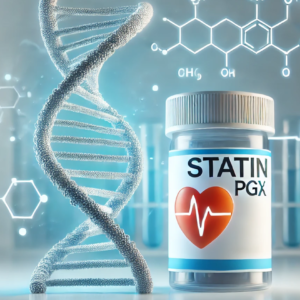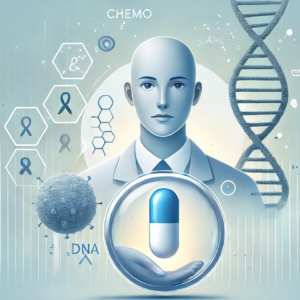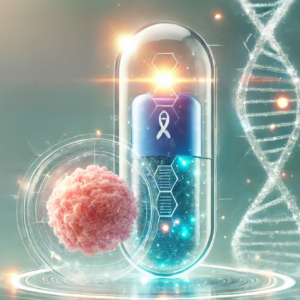Main Onco Drugs PGx Test
The Main Onco Drugs PGx Test is a cutting-edge pharmacogenomic solution designed to optimize cancer treatments by analyzing how your genetic makeup influences your response to key oncology medications. This test provides critical insights into genetic variations that affect the effectiveness and safety of cancer therapies. By integrating genetic testing for cancer drug response with personalized treatment strategies, the Main Onco Drugs PGx test empowers both patients and clinicians to select the most effective cancer treatments while minimizing side effects and enhancing outcomes.
1. Who Should Take the Main Onco Drugs PGx Test?
The Main Onco Drugs PGx test is essential for individuals who are:
- Undergoing cancer treatment and want to understand how their body will respond to specific cancer drugs.
- Concerned about potential side effects from chemotherapy or targeted cancer therapies.
- Interested in optimizing their cancer treatment plan through personalized, gene-guided recommendations.
- At risk for genetic variations that affect drug metabolism and efficacy.
- Seeking a personalized approach to reduce adverse effects and enhance treatment effectiveness.
2. Why is this Test Important?
Cancer treatment is highly individualized, and genetic differences can significantly impact how a person responds to cancer drugs. Understanding your genetic profile through cancer pharmacogenomics testing allows for tailored treatment strategies that can improve therapeutic outcomes and reduce the likelihood of side effects.
Here are the key reasons why genetic testing for targeted cancer therapies is crucial:
- Improves drug effectiveness: Genetic insights ensure the right drug is chosen for the right patient, optimizing the therapeutic impact.(4)
- Reduces side effects: Certain genetic markers can predict adverse drug reactions, helping to select medications and dosages that minimize risks.(4)
- Personalized therapy: Pharmacogenomic testing for cancer drugs supports the use of precision medicine, where cancer treatment is customized to each individual’s genetic profile.(6)
- Enhances survival rates: By using the most suitable drugs based on genetic testing, patients are more likely to experience better responses, improving survival outcomes.(5)
Genetic Insights in Oncology – Enhancing Drug Efficacy Through Pharmacogenomics:
India faces a growing cancer burden, with an estimated 14,61,427 new cases in 2022, highlighting the need for early detection, risk reduction, and effective management strategies to combat the rising incidence of cancers such as lung and breast in adults and lymphoid leukemia in children(1)
The economic burden of cancer treatment in India is substantial, with patients facing an average out-of-pocket expenditure (OOPE) of ₹8,053 for outpatient visits, ₹39,085 for hospitalizations, and ₹331,177 annually per patient for cancer treatment. This results in significant financial strain, including catastrophic health expenditures and impoverishment, especially among economically disadvantaged groups. To alleviate this burden, it is crucial to implement cost-effective treatment strategies.(2)
Hot flushes as a side effect in postmenopausal women on tamoxifen may indicate an increased risk of breast cancer, underscoring the importance of closely monitoring therapy-related symptoms..(3)
3. DrOmics Pharmacogenomics Test for Main Onco Drugs
DrOmics Labs offers a comprehensive Main Onco Drugs PGx Test, providing critical genetic insights to guide personalized cancer treatment. This test analyzes genetic markers associated with immunotherapy, and targeted therapies, helping oncologists determine the most effective drugs based on an individual’s genetic profile. By identifying genetic predispositions to drug metabolism and potential side effects, the test ensures safer treatments, reduces adverse reactions, and enhances drug efficacy. DrOmics Labs empowers both patients and clinicians with tailored recommendations to optimize cancer therapy and improve treatment outcomes.
| Drug | Disease |
| prednisone | Acute leukemia |
| pegaspargase | acute lymphoblastic leukemia |
| tipifarnib | acute myeloid leukemia |
| alemtuzumab | B-cell chronic lymphocytic leukemia |
| lenalidomide | Blood cancer |
| bortezomib | |
| tamoxifen | breast cancer |
| anastrozole | |
| letrozole | |
| exemestane | |
| estradiol | |
| endoxifen | |
| N-desmethyltamoxifen | |
| bevacizumab | Multiple Cancers |
| hmg coa reductase inhibitors | |
| geldanamycin | |
| Bisphosphonates | |
| conjugated estrogens | |
| interferons | |
| nelfinavir | |
| prednisolone | |
| sunitinib | cancers of the kidneys, stomach, and pancreas |
| cetuximab | head and neck and colorectal cancer. |
| trastuzumab | HER2-positive breast cancer |
| pamidronate | hypercalcemia of malignancy |
| temsirolimus | kidney cancer |
| axitinib | kidney cell cancer |
| imatinib | leukemias |
| Sorafenib | liver, Kidney, thyroid cancers |
| thalidomide | multiple myeloma |
| cladribine | Multiple Sclerosis (MS) and hairy cell leukemia. |
| ABT-751 | Non-Small Cell Lung Cancer |
| raloxifene | prevent bone loss and treat breast cancer in postmenopausal women |
| lonafarnib | Processing-deficient progeroid laminopathies |
| abiraterone | prostate cancer |
| atrasentan | |
| sirolimus | rare tumours |
| imiquimod | skin cancer |
| erlotinib | small cell lung cancers |
4. How Does This Work?
- Sample Collection: A non-invasive DNA sample is collected using a simple cheek swab.
- Comprehensive Analysis: The sample undergoes advanced genetic testing to identify relevant markers influencing chemotherapy drug response.
- Detailed Reporting: A comprehensive report highlights your genetic predispositions, potential drug interactions, and recommended treatment adjustments.
- Expert Consultation: Results are reviewed with a genetic counselor or oncology specialist to create a personalized treatment plan tailored to your needs.






Reviews
There are no reviews yet.